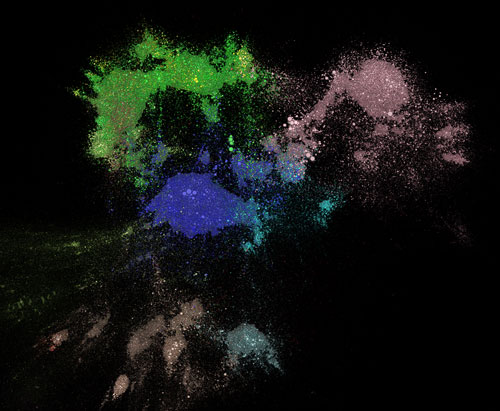Tag archives: diversity in science
The cure is success

Jim Gates. (Courtesy: John T Consoli, Cheltenham Science Festival)
By Margaret Harris
Last Sunday I went up to Cheltenham for the final day of the town’s annual Science Festival. My plan was to meet the University of Maryland theorist Jim Gates before lunch and then stay to hear his lecture on science and policy.
I was already somewhat familiar with Gates’ research thanks to a feature he wrote for Physics World in June 2010. I could also have made an educated guess about his activities as a member of the President’s Council of Advisers on Science and Technology (PCAST). However, I knew very little about his personal history before his evening lecture, when he was interviewed by the physicist and science presenter Jim Al-Khalili.
Gates was born in 1950 and grew up during a period when African-Americans faced severe institutionalized discrimination across the US. However, being from a military family helped insulate him from some of the worst effects, and he told the audience that he didn’t feel the full impact until his family moved to Florida after he turned 11. For the first time, he attended a racially segregated school, and there, he said, he had “the very curious experience of having to learn how to be black”.
British scientists from ethnic minority backgrounds share their life stories
By James Dacey
What does it mean to be a scientist from an ethnic minority background? Is it harder to get career breaks and to reach the top of a field? Can your background actually be a source of inspiration? Is it even useful to anyone to be discussing these questions?
These are among the issues touched upon in a new series of video interviews with 10 British scientists with minority ethnic heritage. The interviews were conducted by researchers at the British Library as part of a larger audio history project commissioned by the Royal Society called Inspiring Scientists: Diversity in British Science. You can watch all 10 interviews on the Royal Society website.
Scientists face discrimination when choosing a PhD
By Hamish Johnston
One of the most important decisions any aspiring scientist must make is what they should study for their PhD. Therefore, any advice that they receive from established academic researchers is of great value – and many academics are very generous with their time when it comes to mentoring up-and-coming researchers.
But do academics tend to reach out to some groups of people while ignoring others? That’s the subject of a study by three business-school professors – Katherine Milkman, Modupe Akinola and Dolly Chugh – who wanted to know if a person’s gender or ethnic origin affects their chances of booking an appointment with an academic to discuss their future.
BICEP2 surprise visit, a bizarre rant, credible science fiction and more
By Hamish Johnston
The big story this week is that astronomers working on the BICEP2 telescope may have spotted the first direct evidence for cosmic inflation. This is very good news for the physicist Andrei Linde, who along with Alan Guth and others did much of the early work on inflation. In the above YouTube video Linde, who is certainly in the running for a Nobel prize, receives a surprise visit from BICEP2 team member Chao-Lin Kuo. Kuo is the first to tell Linde and his wife, the physicist Renata Kallosh, the news that the theory that Linde developed more than 30 years earlier had finally been backed up by direct observational evidence. Not surprisingly, champagne glasses are clinking!
Here at physicsworld.com we have tried to tell both sides of the story: the thrill of seeing the first hints of cosmic inflation, tempered with calls for caution that more data are needed before inflation is victorious over other theories describing the early universe.
View all posts by this author | View this author's profile
Welcome to the arXiv galaxy

Visualizing the interactive arXiv landscape. (Courtesy: Damien George, Rob Knegjens)
By Matthew Chalmers
With almost a million articles accrued over the past two decades, the arXiv preprint server has become an indispensable tool for physicists.
Now, thanks to a website called Paperscape developed by theoretical physicists Damien George at the University of Cambridge in the UK and Rob Knegjens at Nikhef in the Netherlands, its vast content can be visualized in all its glory.
The interactive graphic is based on a nifty algorithm that groups arXiv papers that cite each other together, as if they were linked by invisible springs, but forces those that don’t to repel each other. The resulting map resembles an irregularly shaped galaxy in which each “star” is a scientific paper, revealing how the various categories of research (shown in different colours) relate to each other.
One good sign
By Margaret Harris at the APS March Meeting in Baltimore
“Science remains institutionally sexist. Despite some progress, women scientists are still paid less, promoted less, win fewer grants and are more likely to leave research than similarly qualified men.” The opening lines of Nature’s recent special issue make an arresting – if depressing – summary, so it’s not surprising that Roxanne Hughes chose them to kick off yesterday’s press conference on women in science, technology, engineering and mathematics (STEM) at the APS March Meeting.
Hughes, an education expert at the US National High Magnetic Field Laboratory, spoke about a study she’d done of 26 women undergraduates. All of them entered university with the intention of studying a STEM subject, and 12 had enrolled in a “living and learning community” that offered specialized mentoring opportunities and the chance to live with other female science students. Such programmes have often been touted as a way of helping women persist in science, but on Hughes’ evidence, this particular one made not a whit of difference, at least in numerical terms. The 12 students in the study who switched to non-STEM fields were evenly split between those who participated and those who didn’t.
View all posts by this author | View this author's profile
The Finkbeiner test
By Margaret Harris
Here’s a little game for you to play the next time you read a profile of a woman in science. As you read the article, count the number of times it mentions:
The fact that she is a woman
Her husband’s job
Her childcare arrangements
How she acts as a “nurturing figure” towards junior scientists
How she was taken aback by the competitiveness of her field
That she’s a “role model” for other women
How she’s the “first woman to…”
If the article’s total score is anything other than zero, then it fails the Finkbeiner test.
View all posts by this author | View this author's profile